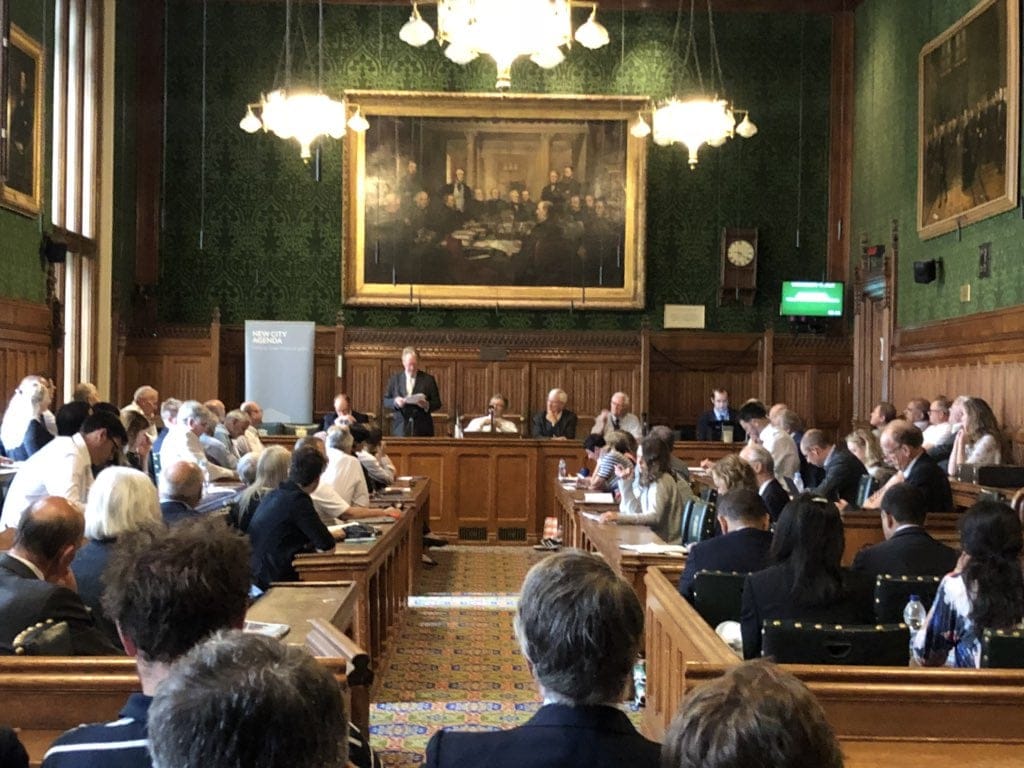A well-attended New City Agenda event heard from Anthony Stansfeld, the Thames Valley Police and Crime Commissioner, on the HBOS banking fraud and the lessons from this scandal. Stansfeld strongly rebuked the actions of senior board members of the Banks, their ongoing complicity in attempting to cover-up large- scale frauds, their mis-treatment of SMEs and proposed reforms to the current financial regulatory system, which clearly is not and will not work whilst the Banks can continue to exert control without transparent checks and balances.
The Thames Valley Police and Crime Commissioner also revealed that Lloyds Bristol may be guilty of a much larger fraud than HBOS, which has yet to be properly investigated.
Victims of banking misconduct from HBOS, Lloyds and RBS were present along with MPs representing many constituents who have suffered due to large-scale fraud, members of the House of Lords, members from the APPG on Fair Business Banking, the SME Alliance and members of the financial services litigation team at LEXLAW were all present to hear Anthony Stansfeld’s rebuke of endemic large-scale financial fraud, which spreads much further than the conviction of middle-management in one regional office in Reading.

Anthony Stansfeld rebukes endemic financial fraud
The powerful message coming from the most senior figure in British policing and an integral figure in tackling large scale financial fraud is that Lloyds and other UK banks have been guilty of corrupt practices and:
- Bank-commissioned “independent” review schemes- such as Professor Russel Griggs’ review of HBOS Reading– are “derisory” especially given the lack of either consequential loss or cumulative loss coupled with a “frightening” gagging order;
- Dame Linda Dobbs’ independent review is a “review done properly”, and Stansfeld suggested that an interim report should be available by October 2018;
- reports such as Project Lord Turnbull, leaked onto the APPG website, highlight in “devastating detail” the dishonest and “disgraceful” actions of senior banking figures and the continuing cover-up by Lloyds of major fraud and the hole in HBOS’ accounts;
- many frauds across Banks have not been properly investigated, especially Lloyds Bristol, which maybe larger than the HBOS scandal;
- victims of financial fraud are common-place, as was highlighted in the Parliamentary debate, Stansfeld noted that victims of “business support” “profit-churning centres” of Lloyds’ BSU, RBS’s GRG and NAB Clydesdale, have still yet to be fully compensated (if at all);
- over £200 billion is the quantum of fraud in the UK, less than 1% of serious organised crime is investigated and only the one office of HBOS Reading has been successfully prosecuted.
The next steps in tackling large scale banking fraud
Anthony Stansfeld rebuked the Treasury’s ignoring of the “destitution” of SMEs from the offices of Gordon Brown to Phillip Hammond. SMEs contribute more to the UK economy than large multinationals and he criticised the Treasury for taken the interests of the Banks’ more into account (especially when many civil servants end up in Bank employ further into their careers). Large scale fraud in HBOS Reading was only uncovered after a 10 year and £7 million investigation by the Thames Valley Police instigated by Paul and Nikki Turner. Clearly, as Stansfeld suggested, a better system is needed to uncover fraud:
- A US-style Chapter 11 system may go some way to prevent predatory business support units stripping SMEs of their assets, by allowing debtor businesses time to restructure and pay its creditors over time.
- Chairmen of Banks and its senior Board members must not be placeholders, but must be qualified bankers that understand the rules and not salesmen.
- Fraudulent bankers must be arrested and prosecuted like in the US, who have a much cleaner system.
- The SFO and the FCA must be properly independent to the Treasury.
- Civil servants should not be able to move effortlessly into Bank jobs.
- The SRA, the Royal Institute of Chartered Surveyors (RICS) and Insolvency Practitioners Association (IPA) must be held to account for some of their members complicity in aiding and abetting financial fraud by Banks.
- More funding is required for financial fraud investigations for the Serious Fraud Office (SFO) and specialist regional fraud police units are required.
- A system of recompense for victims of banking fraud is required: Stansfeld advocated for a removal of the 6 year statutory limit; restrict the use of personal guarantees; stop Banks using large amounts of shareholder money on expensive London lawyers to protect themselves.
LEXLAW Banking Litigation & Dispute Resolution
It is an absolute must that victims of Lloyds BSU, RBS GRG or other bank BSUs protect their legal rights. This is the only sensible course of action when a business is facing a high value dispute with a major bank, such as the Royal Bank of Scotland or National Westminster Bank. Otherwise, if there is no redress scheme, or if the bank refuses to offer reasonable redress, customers may well find they are time-barred from commencing legal action and their high value claim is now worthless. Legal rights can be protected by taking urgent legal advice and by instructing specialist financial services litigation solicitors to issue a protective claim form or by instructing us to prepare and agree a carefully written standstill agreement.
Our Financial Services Litigation team of Solicitors and Barristers in London are highly experienced in banking litigation and specialise in representing SMEs in banking disputes. Our high profile and high value cases regularly appear in the national and international media. Our banking litigators advise on the protection of borrower legal rights in the face of predatory bank practices. We have successfully managed and settled court litigation against all major UK banks. Call us on ☎ 02071830529 or complete our online contact form.
Financial Services Litigation Team, LEXLAW
